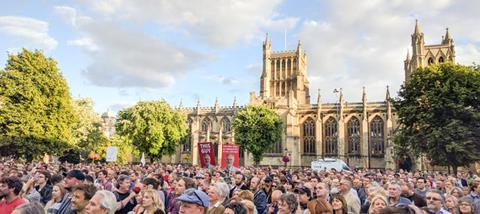
The word actually has a vintage of half a century. It was coined by Vogue magazine 50 years ago when referring to changes in the fashion world. However its use in the past year has increased five-fold thanks to the high voter turnout in the recent general election.
I have to confess that I missed the boat on this word. It’s tremors missed my radar, along with other candidates for ‘word of the year’: ‘Broflake’ (a man who is readily upset or offended by progressive attitudes that conflict with his more conventional or conservative views) and ‘newsjacking’ (taking advantage of current events to promote a brand). However, my issue is not with any lack of use of the word by me or by wider society, but the lack of existence of this phenomenon in the first place.
The run-up to the 2017 general election was full of media posts of Jeremy Corbyn surrounded by young people and rap artists, as well as a speech about university fees and the housing crisis at Glastonbury music festival stage. And it seemed to make a difference for the turnout among younger people. But we woke up the next day to little change. For those who had hoped and voted for this change, it was similar to the previous Brexit vote. It is estimated 64 per cent of 18 to 24-year-olds voted in the referendum. Of those, 70 per cent voted remain. Yet we are leaving the European Union.
Whatever your political viewpoint, there seems to be a clear running narrative. This so-called ‘youthquake’ appears to be a storm in a teacup. As young people do what they can to define their future, there appears to be no tangible difference. Casper Grathwohl, president of Oxford Dictionaries described one reason for their choice as the narrative that is gives: “at a time when our language is reflecting our deepening unrest and exhausted nerves, it is a rare political word that sounds a hopeful note.” I think this only works if the quake makes any difference. Until it does it merely feeds a narrative of generational divide.
So what do we have to learn from this as youth and children’s workers and parents helping to raise the next generation? How can we make a positive narrative for those nearing the voting age? How can we avoid this frustrating narrative of continued side-lining in our churches, and wider?
First, we need to hear what young people want from church. I don’t mean changing the seating to bean bags and the drinks to milkshakes. I mean giving them a role in church where they are heard. Why not allow them on your prayer ministry team? Or preaching team? Or church committee? Let them see that their gifts are God-given, not for the future but now. Give them a chance to try, and maybe even fail, as part of a community that helps them to see their mark on the church. When children and young people see their change there, maybe they can see it elsewhere on their community or on the world globally.
Join the conversation! Let us know what you think on Twitter @YCWmag or Facebook.






































